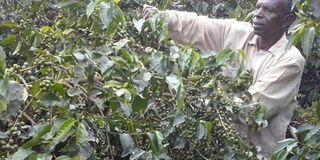Coffee farming offers retiree rich pickings

“Every week, I receive at least 20 farmers coming to learn best practices in coffee farming,” says coffee farmer Peter Kamunu. PHOTO | CORRESPONDENT |
What you need to know:
- Samuel Kamunu now earns over Sh200,000 an amount he never dreamt of.
- He has plans of adopting high yield coffee varieties being offered by Nestlé and Coffee Management Services
It is only in his retirement that coffee farmer Samuel Kamunu has enjoyed the sweat of his hard work.
At 66, Mr Kamunu, smiles with awe at the sight of his expansive coffee farm; the business that has drawn him a life full of peace even as it helped him meet his household needs.
The father-of-five spent his youthful days working at Kenya Bus Service as an oil cleaner. He was later promoted to a decorator before retiring in 2004 as a supervisor.
The highest salary the man from Tetu, Nyeri County, ever earned was Sh18,000. The pay was barely enough for his family upkeep. But as a coffee farmer, he now earns over Sh200,000 an amount he never dreamt of.
NEGLECTED CROP
“Coffee farming just thrills me, during the World Coffee Day celebrations on September 29, I felt part of a wider community that knew the worth of a once neglected crop,” he told Money.
Back in his village, Mr Kamunu’s 4.3-acre farm was used for subsistence farming. The farm, with 200 coffee trees, was neglected.
The coffee was not doing well, small-scale farmers were losing interest due to low-income, coffee berry disease and poor yields.
“Coffee farming was an old man’s job then, but this has since changed as more youth learn the worth of the crop,” he said.
On retiring, Mr Kamunu was rewarded with a Sh152,000 — a package which he invested in his farm to revive the ailing crop.
“My wife used to earn Sh1,500 per year from the 200 trees by then. We weeded, sprayed and pruned,” he noted.
At the end of 2005, they harvested over 700 kilogrammes of coffee.
However, beverage company Nestlé’s intervention in 2011 brought forth better knowledge on coffee farming to Mr Kamunu.
Nestlé partnered with Coffee Management Services to support coffee farmers through co-operatives in the area.
“They employed an agronomist who held training sessions helping us discover how we could maximise our returns,” he said.
They were taught how to prune, manage soil, pests and control diseases as well as fertilisation.
“I would get back home every day to practice the skills and review my notes,” said Mr Kamunu.
By the end of 2011, his yields had increased to 2,300 kilogrammes, an average of 11.5 kilogrammes per tree.
The rewards of his hard work were showing fast, and in 2013, Nestlé featured him in its annual Nescafé Plan report for producing over 3,000 kilogrammes of grade A coffee.
DIVERSIFY
“I have made it at my retirement. Last year, I made over Sh200,000 which I never even dreamt about in my professional life,” he said adding that he regrets why he left the village for Nairobi.
His earnings have helped him diversify his income sources; he now has a dairy cow which produces over 15 litres of milk per day, earning him an extra Sh500 daily.
“I am now in the process of putting electricity in my house,” he told Money.
Mr Kamunu now believes that he would be a lot richer had he not abandoned his land.
“I feel sad for youth who are moving from the village to work as touts or push mkokoteni (carts) in the city,” he said.
“Every week, I receive at least 20 farmers coming to learn best practices in coffee farming, I got the knowledge free of charge and I am happy to pass it over to other farmers,” said Mr Kamunu.
He has plans of adopting high yield coffee varieties being offered by Nestlé and Coffee Management Services; an initiative which he believes will take his farming to greater heights.





